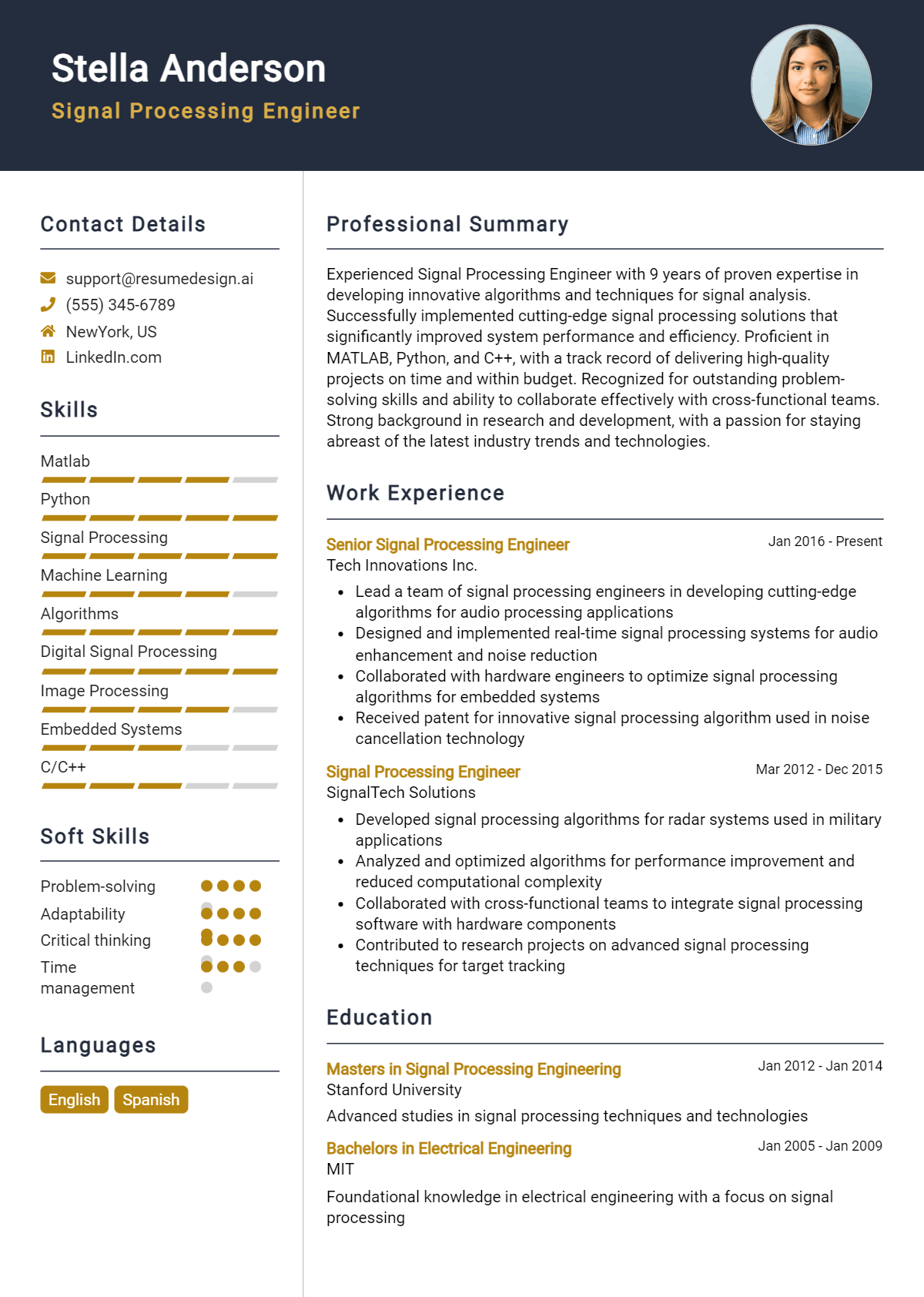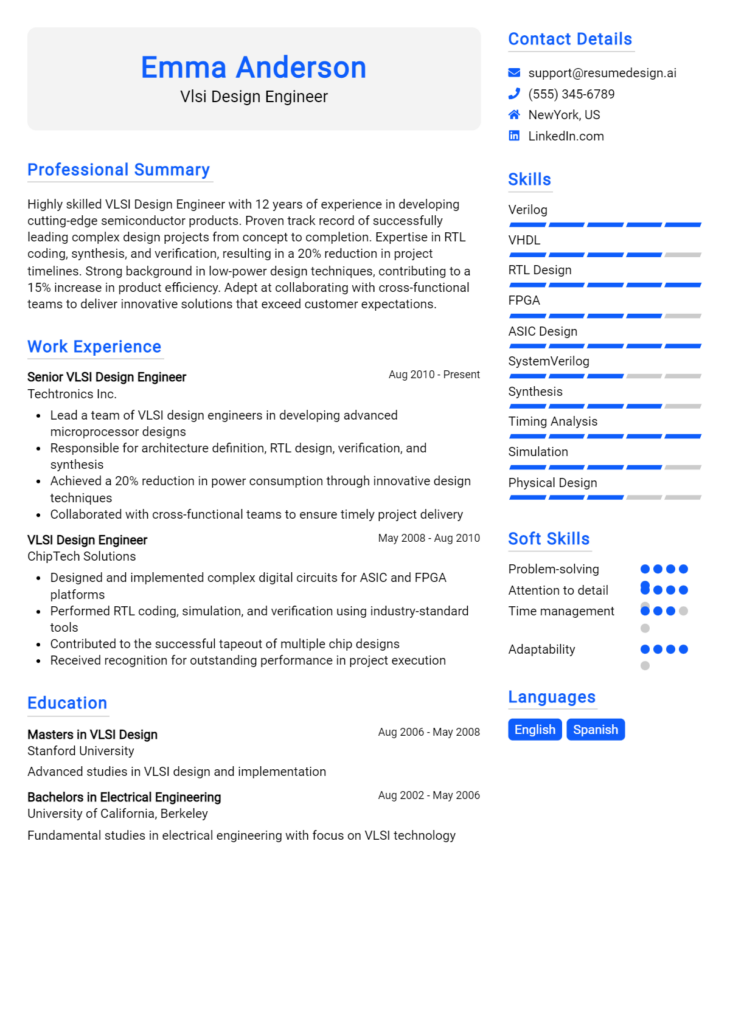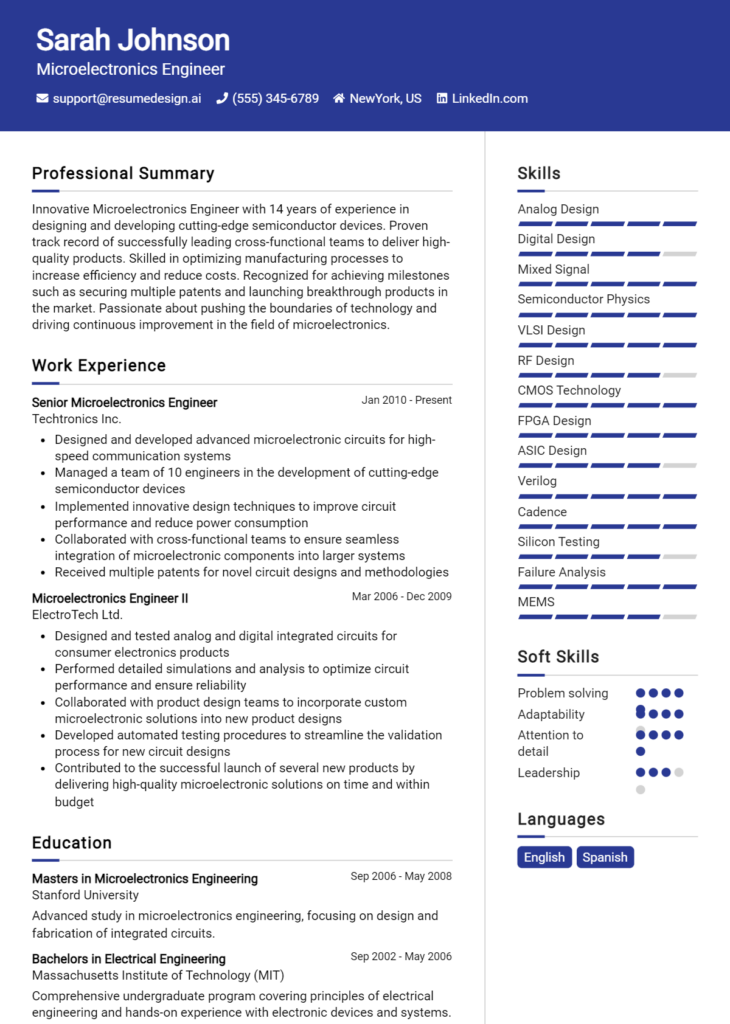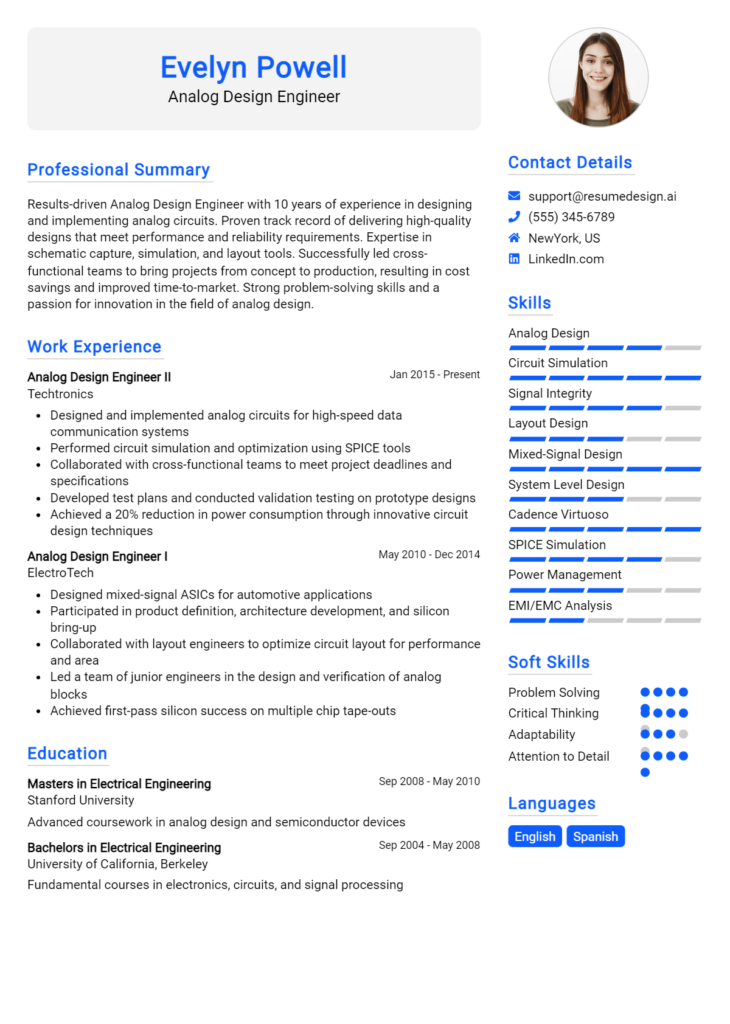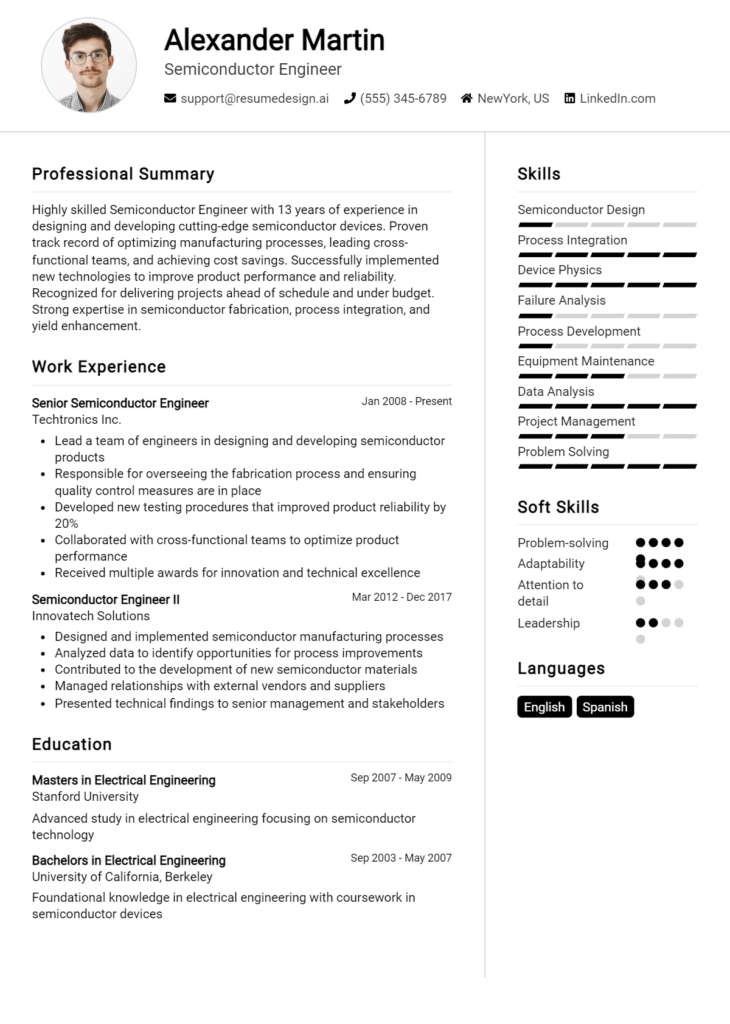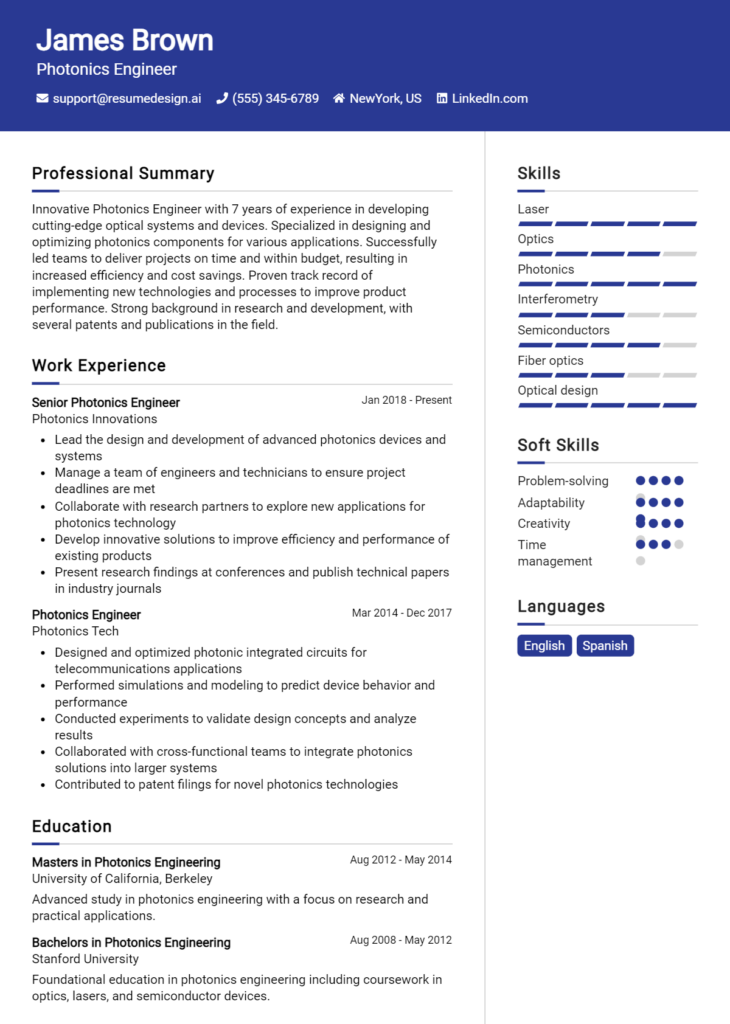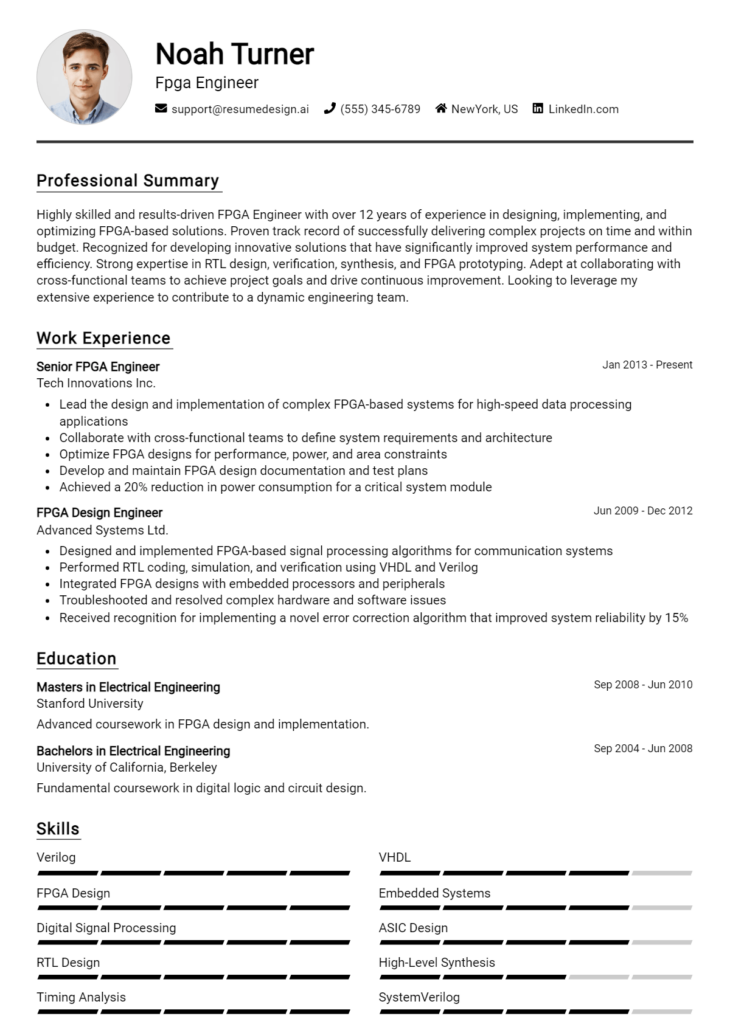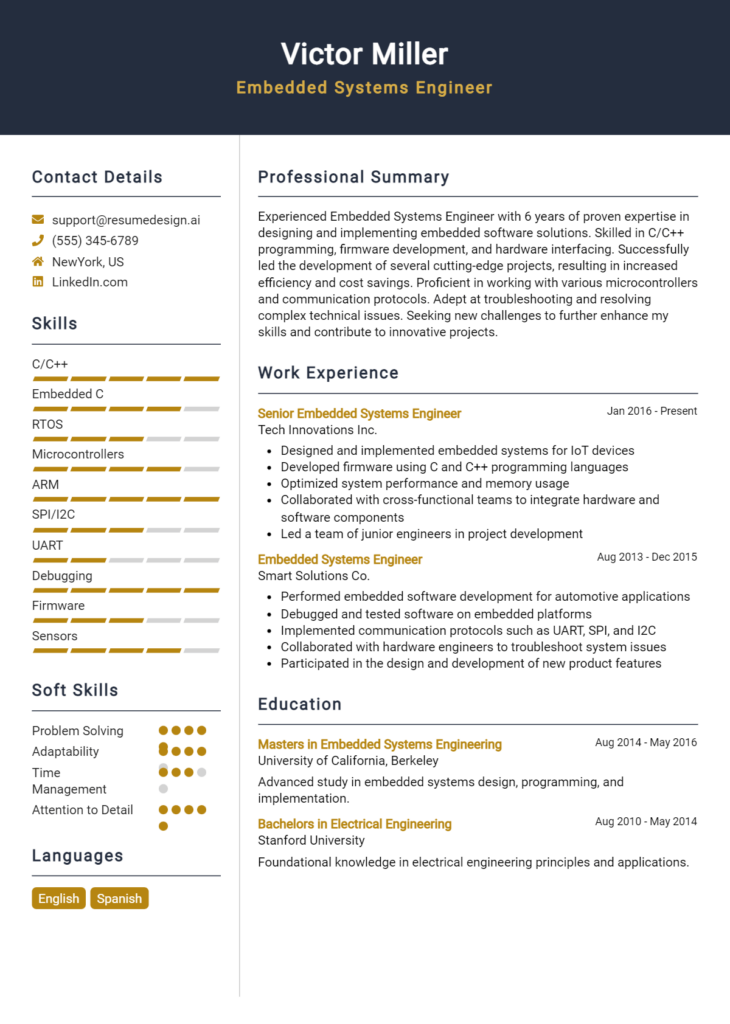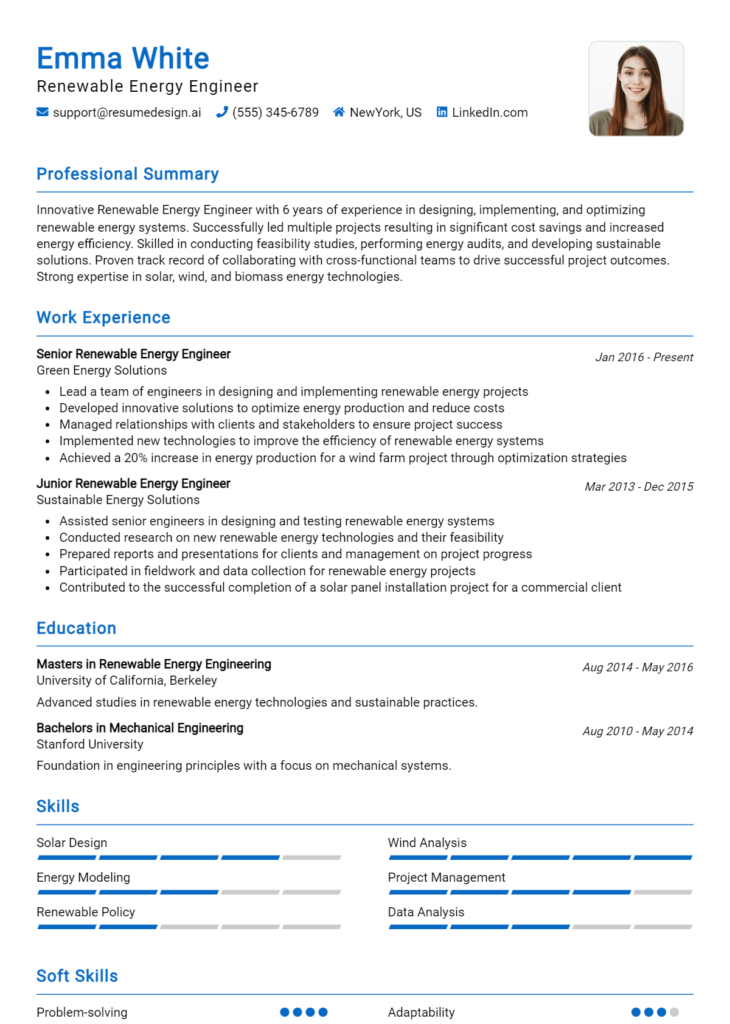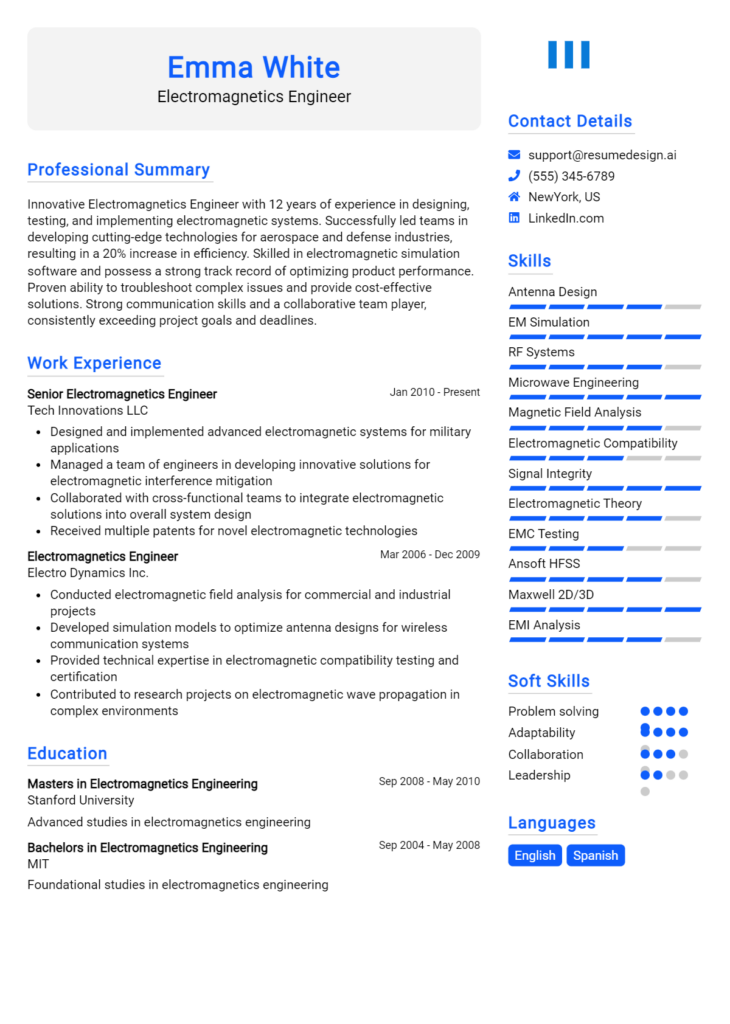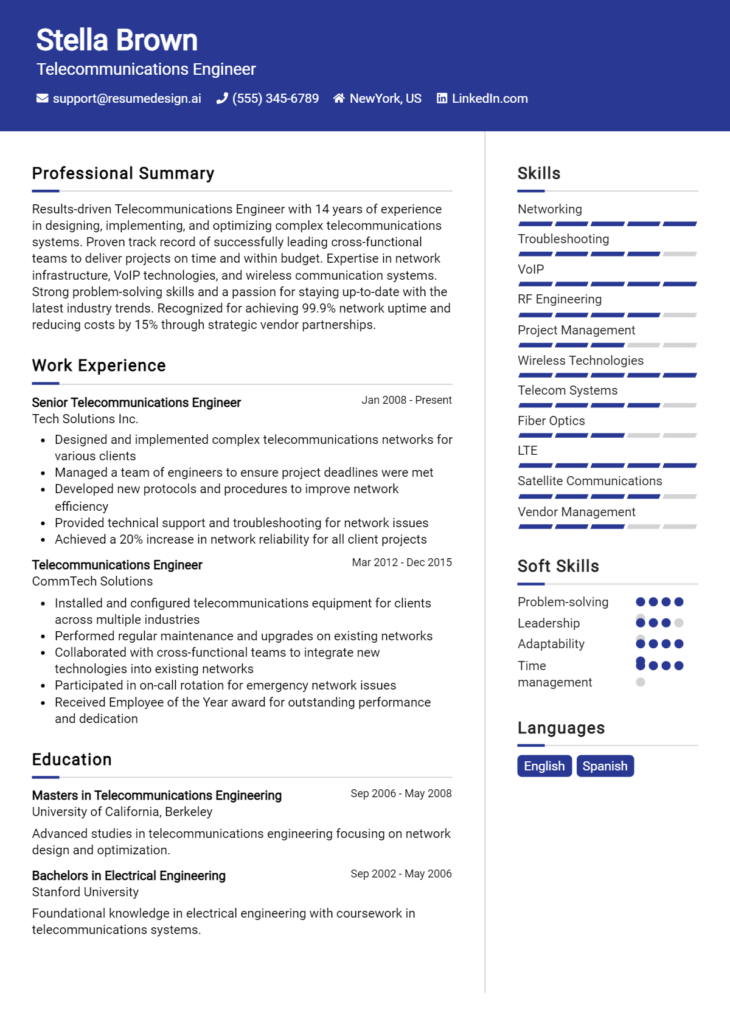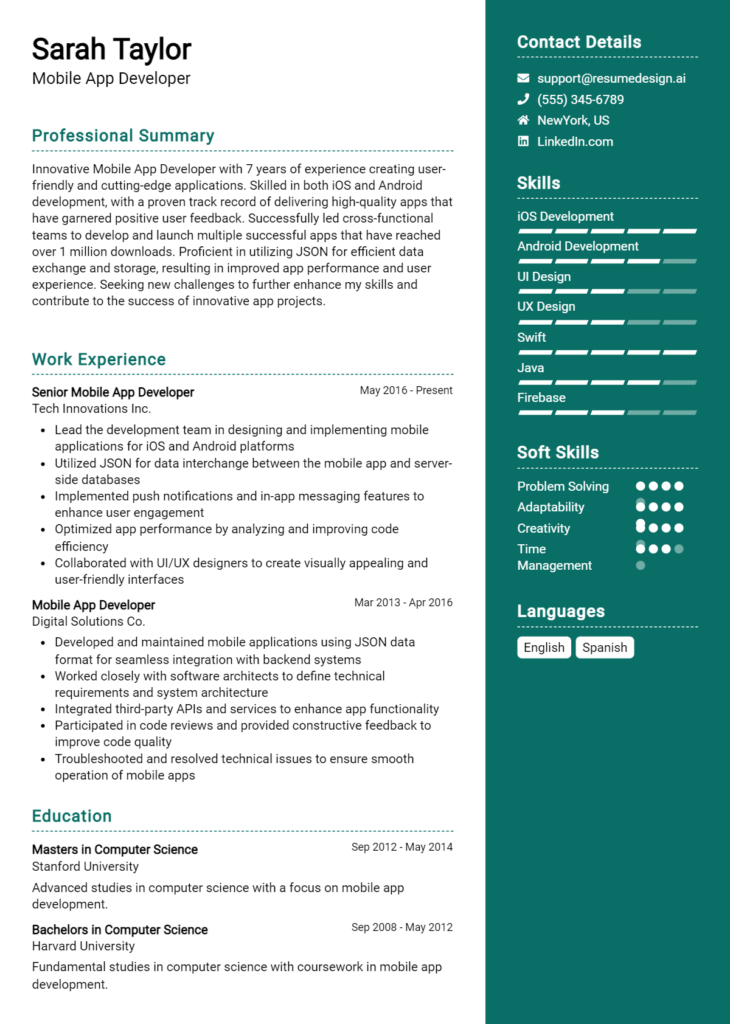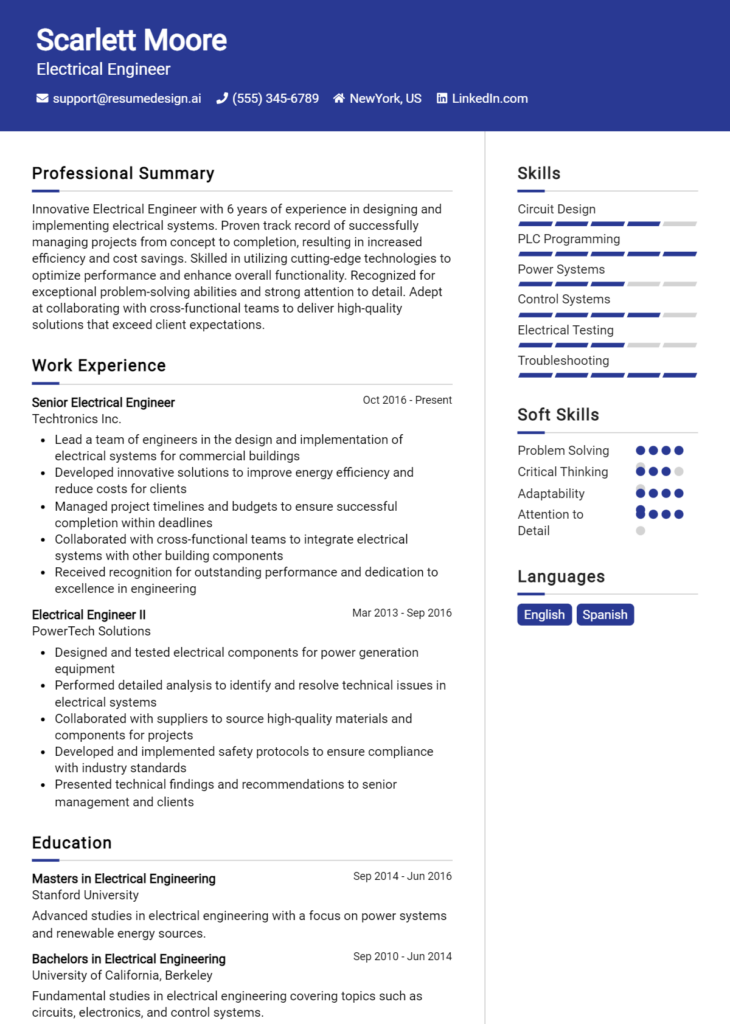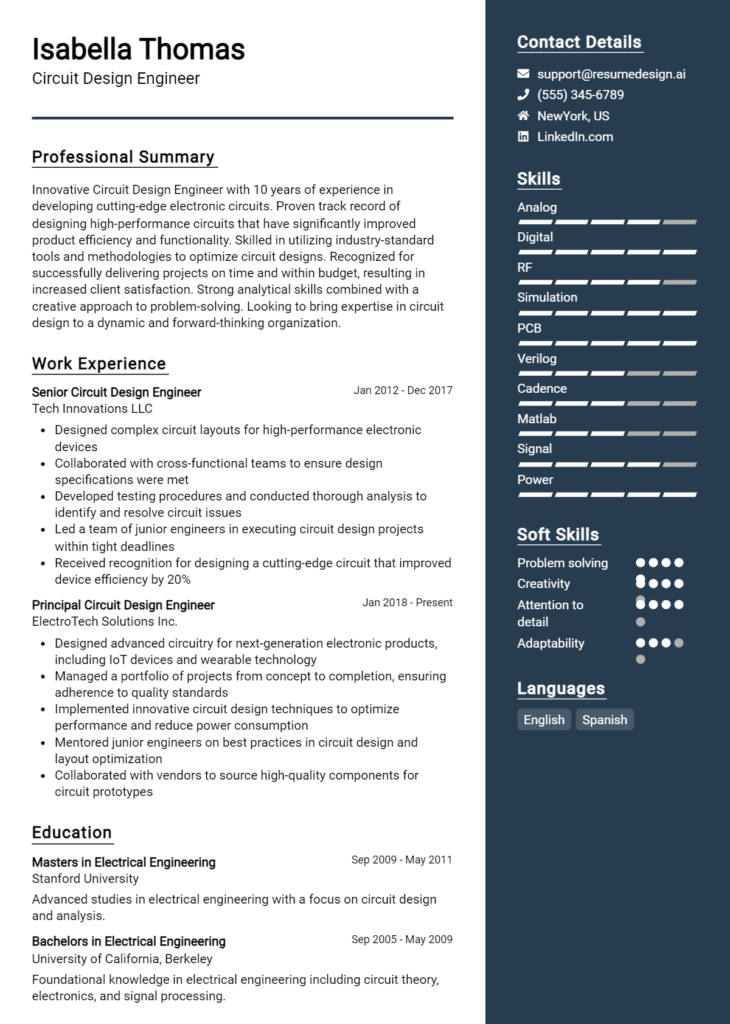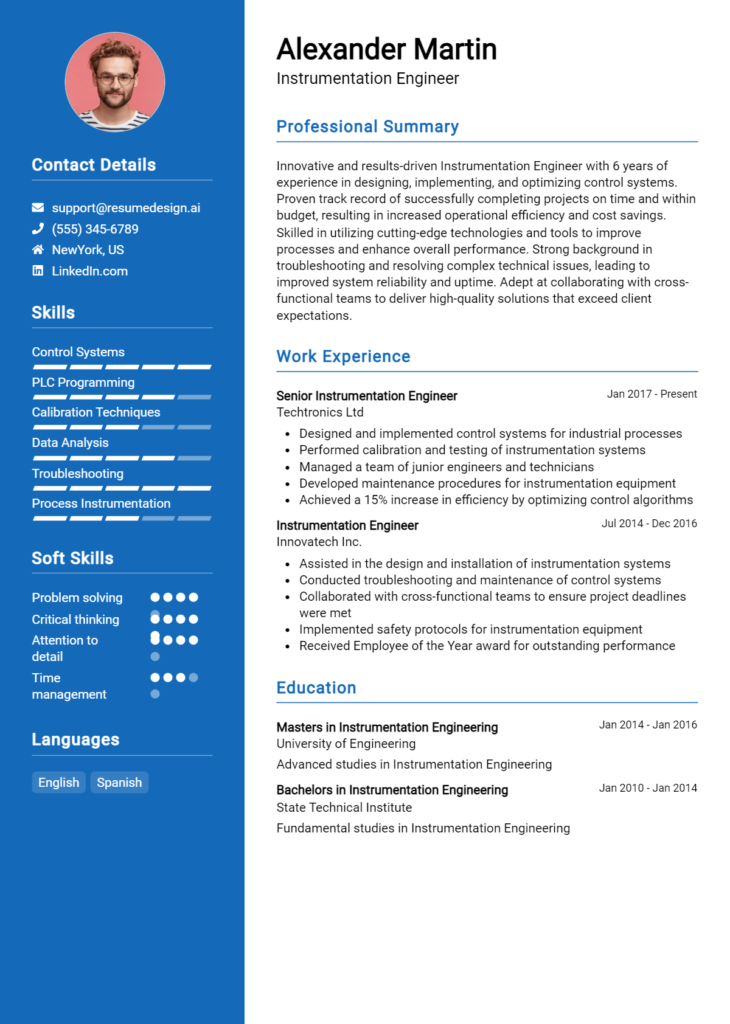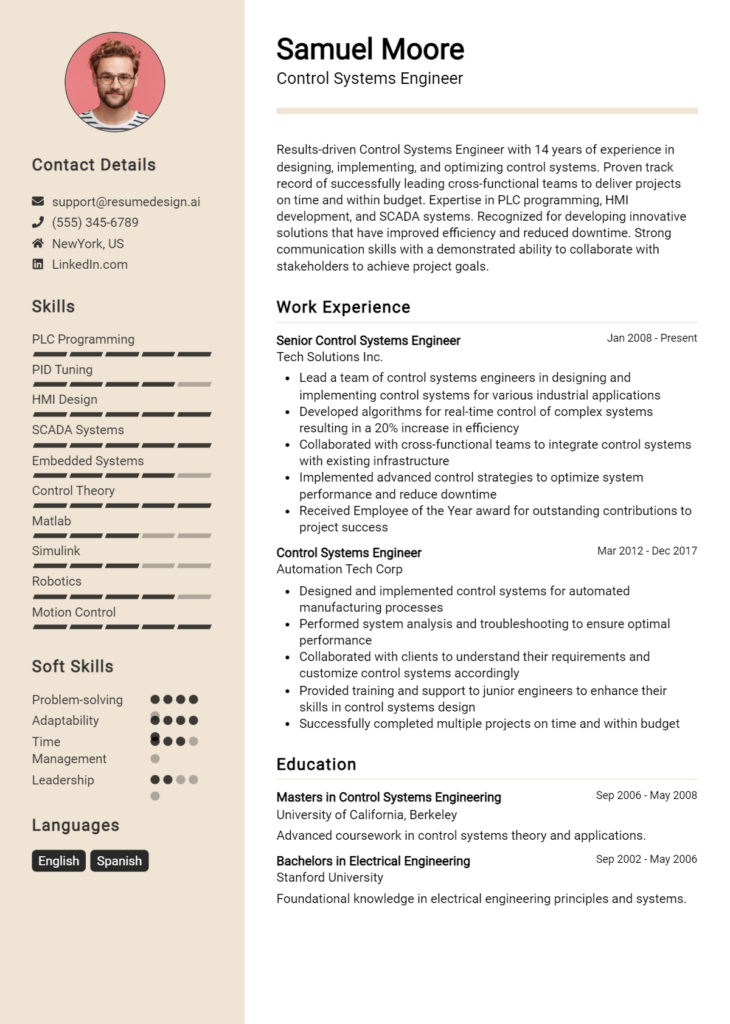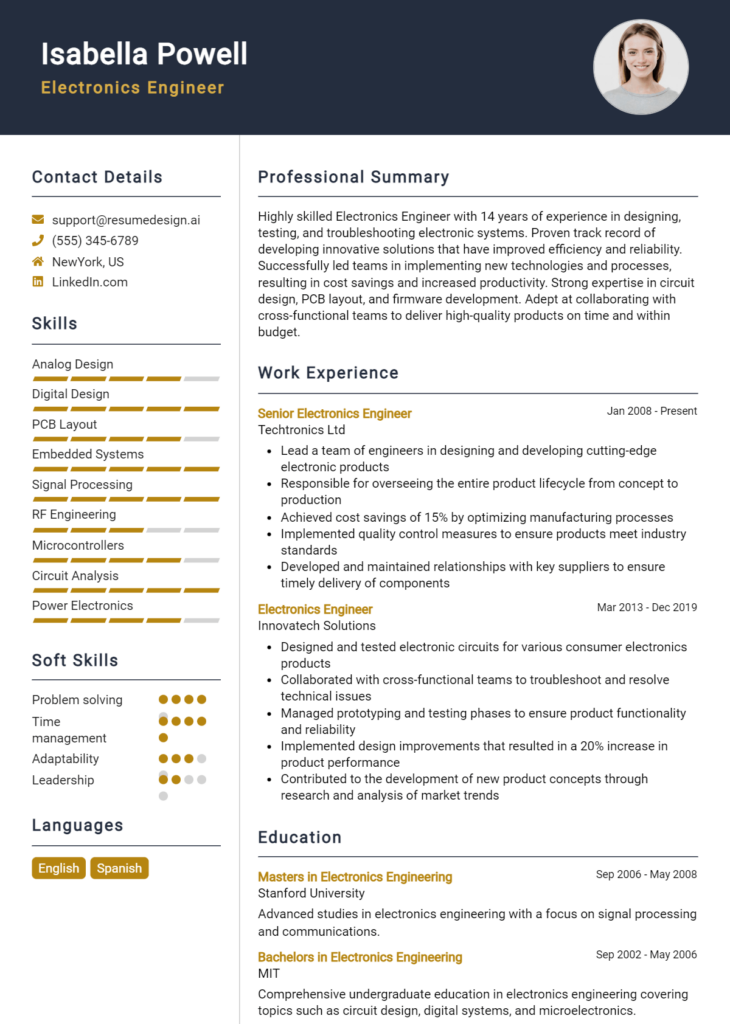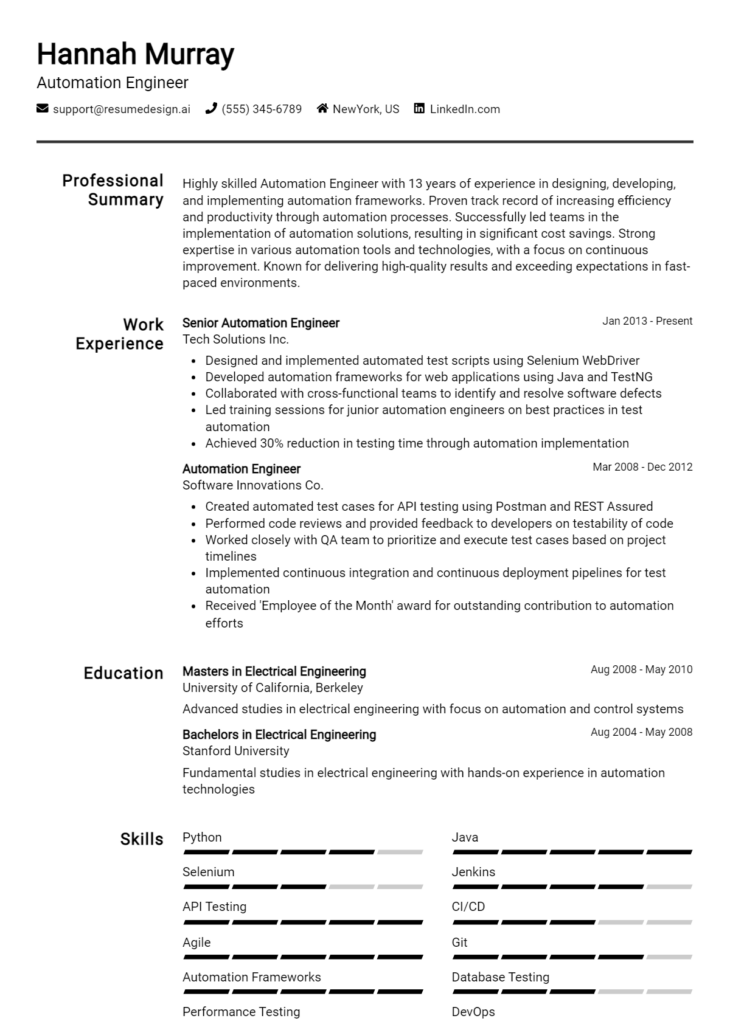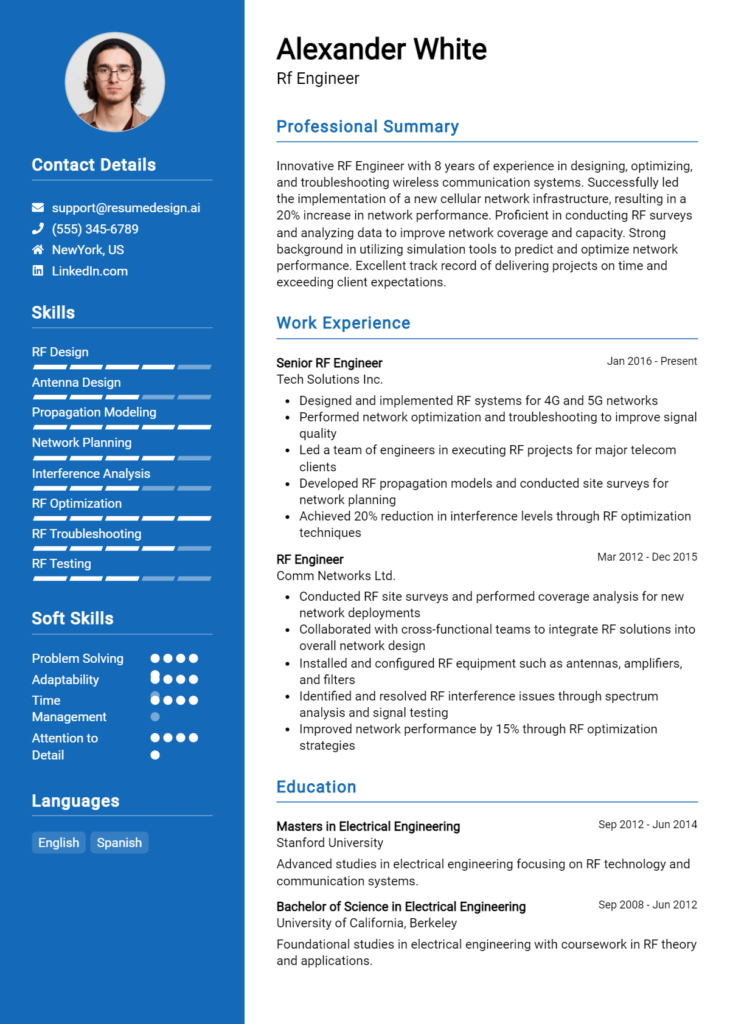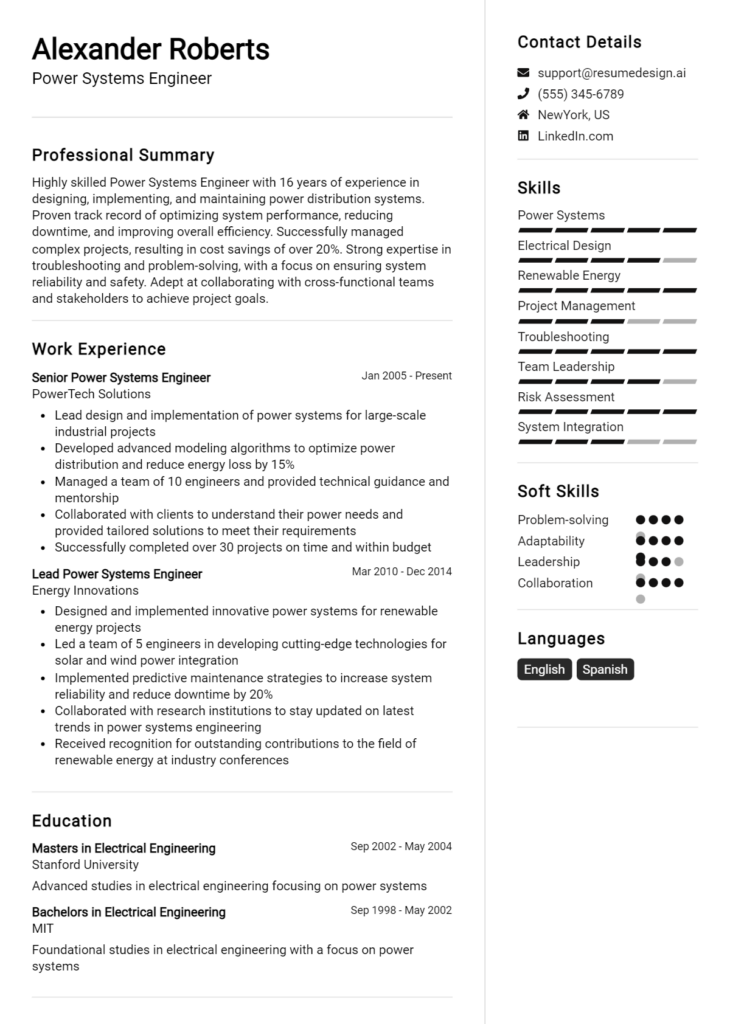Signal Processing Engineer Core Responsibilities
A Signal Processing Engineer plays a crucial role in analyzing and manipulating signals to improve communication systems and data interpretation. Key responsibilities include designing algorithms, developing signal processing techniques, and collaborating with cross-functional teams such as hardware engineers and software developers. Essential skills encompass technical proficiency in DSP, operational excellence in implementing solutions, and strong problem-solving capabilities. These competencies are vital for achieving organizational goals, and a well-structured resume can effectively highlight these qualifications to prospective employers.
Common Responsibilities Listed on Signal Processing Engineer Resume
- Design and implement signal processing algorithms for real-time applications.
- Analyze and optimize system performance through simulation and testing.
- Collaborate with cross-disciplinary teams to integrate signal processing solutions.
- Develop software tools for data analysis and visualization.
- Conduct research to advance signal processing methodologies.
- Document designs and maintain detailed technical specifications.
- Provide technical support and troubleshooting for signal processing issues.
- Stay updated on industry trends and emerging technologies.
- Participate in project management and contribute to project timelines.
- Conduct training sessions to educate team members on signal processing techniques.
- Implement machine learning techniques for advanced signal analysis.
High-Level Resume Tips for Signal Processing Engineer Professionals
For Signal Processing Engineer professionals, a well-crafted resume is not just a document; it’s a powerful tool that can significantly influence your career trajectory. Given that your resume often serves as the first impression you make on potential employers, it must effectively showcase both your technical skills and your notable achievements in the field. A compelling resume can set you apart in a competitive job market, demonstrating not only your proficiency in signal processing but also your problem-solving abilities and innovations. This guide will provide practical and actionable resume tips specifically tailored for Signal Processing Engineer professionals, helping you to present your qualifications in the most favorable light.
Top Resume Tips for Signal Processing Engineer Professionals
- Tailor your resume to the job description by incorporating relevant keywords and phrases that align with the specific requirements of the position.
- Highlight your technical skills prominently, such as expertise in MATLAB, Python, DSP algorithms, and machine learning applications relevant to signal processing.
- Showcase relevant experience by detailing projects or roles that demonstrate your ability to design, analyze, and implement signal processing systems.
- Quantify your achievements by including metrics or results that illustrate the impact of your work, such as improved performance percentages or reduced processing times.
- Include internships, research projects, or academic achievements that are relevant to signal processing to show your commitment and experience.
- Use clear and concise language with bullet points to enhance readability and make it easy for hiring managers to quickly identify your qualifications.
- Demonstrate your problem-solving abilities by providing examples of challenges you’ve faced in previous roles and how you successfully addressed them.
- Incorporate certifications or training that are relevant to the field, such as specialized courses in digital signal processing or related software tools.
- Keep your resume to 1-2 pages, ensuring it is well-organized with clear headings and sections that guide the reader through your professional journey.
By implementing these tips, you can significantly increase your chances of landing a job in the Signal Processing Engineer field. A polished resume that accurately reflects your skills and achievements not only captures the attention of potential employers but also articulates your value as a candidate ready to tackle complex signal processing challenges.
Why Resume Headlines & Titles are Important for Signal Processing Engineer
In the competitive field of signal processing engineering, a well-crafted resume headline or title holds significant importance. It serves as the first impression for hiring managers, effectively summarizing a candidate's core qualifications and expertise in a concise manner. A strong headline can instantly capture attention and encourage further exploration of the resume, setting the tone for the entire application. By being both relevant and directly related to the job being sought, the headline not only highlights key competencies but also aligns the candidate's profile with the specific needs of the employer.
Best Practices for Crafting Resume Headlines for Signal Processing Engineer
- Keep it concise: Aim for a headline that is no longer than a single sentence.
- Be role-specific: Use terminology and keywords that relate directly to signal processing engineering.
- Highlight key strengths: Focus on your most important skills, experiences, or accomplishments.
- Avoid jargon: Use clear and straightforward language to ensure your headline is easily understood.
- Match the job description: Tailor your headline to reflect the specific qualifications mentioned in the job listing.
- Showcase unique value: Emphasize what makes you stand out from other candidates in the field.
- Use action-oriented language: Start with dynamic verbs or impactful phrases to convey a sense of initiative.
- Consider your audience: Think about what hiring managers are looking for and address those needs directly.
Example Resume Headlines for Signal Processing Engineer
Strong Resume Headlines
"Innovative Signal Processing Engineer with 5+ Years of Experience in Algorithm Development"
“Results-Driven Signal Processing Specialist with Expertise in Machine Learning Applications”
“Dedicated Signal Processing Engineer with Proven Track Record in Real-Time Systems”
“Creative Problem Solver in Signal Processing, Specializing in Audio and Image Analysis”
Weak Resume Headlines
“Engineer Looking for Opportunities”
“Experienced Professional in Technical Fields”
The strong resume headlines are effective because they are specific, highlighting relevant skills and experiences that directly relate to the role of a signal processing engineer. They not only grab attention but also provide a quick insight into the candidate's qualifications, making it easier for hiring managers to see the potential fit. In contrast, the weak headlines fail to impress due to their vagueness and lack of focus, offering little information about the candidate's capabilities or the unique value they bring to the position. This lack of specificity can lead to a missed opportunity for the candidate to stand out in a competitive job market.
Writing an Exceptional Signal Processing Engineer Resume Summary
A resume summary is a critical component for any Signal Processing Engineer, as it serves as the first impression for hiring managers and recruiters. An exceptional summary quickly captures attention by effectively showcasing key skills, relevant experience, and notable accomplishments that align with the specific job requirements. By being concise and impactful, a well-crafted summary can differentiate a candidate from others, making it easier for hiring professionals to see the value the candidate brings to the organization. Tailoring the summary to the job description ensures that it resonates with the needs of the employer, increasing the chances of landing an interview.
Best Practices for Writing a Signal Processing Engineer Resume Summary
- Quantify achievements: Use specific numbers and metrics to demonstrate the impact of your work.
- Focus on skills: Highlight the most relevant skills that align with the position you’re applying for.
- Be concise: Aim for 2-4 sentences that succinctly summarize your qualifications.
- Tailor your summary: Customize your summary for each job application to match the job description.
- Use strong action verbs: Start with impactful verbs that convey your contributions effectively.
- Include relevant technologies: Mention specific software, tools, or methodologies that are pertinent to the role.
- Showcase problem-solving abilities: Highlight instances where you've successfully addressed challenges in signal processing.
- Reflect your career goals: Ensure your summary aligns with your professional aspirations and the company's objectives.
Example Signal Processing Engineer Resume Summaries
Strong Resume Summaries
Results-driven Signal Processing Engineer with 5+ years of experience in developing advanced algorithms that improved signal clarity by 30% in telecommunications applications. Proficient in MATLAB and Python, with a proven track record of optimizing digital signal processing systems for reduced latency and enhanced performance.
Detail-oriented engineer specializing in adaptive filtering and spectral analysis, leading a team that reduced noise interference by 25% in audio processing projects. Extensive experience with DSP architecture and real-time processing, contributing to a 40% increase in system efficiency.
Innovative Signal Processing Engineer with expertise in machine learning techniques for signal classification, achieving a 15% increase in accuracy for predictive maintenance models. Skilled in using C++ and TensorFlow, I have successfully implemented algorithms that enhanced signal detection in challenging environments.
Weak Resume Summaries
Signal Processing Engineer with some experience in the field. Looking for opportunities to grow and utilize my skills.
Engineer with a background in signal processing. Interested in working on projects related to telecommunications and audio.
The examples provided illustrate the key differences between strong and weak resume summaries. Strong summaries are characterized by their specificity, quantifiable outcomes, and relevance to the role, showcasing the candidate’s accomplishments and skills effectively. In contrast, weak summaries lack clarity and detail, making them generic and less impactful, which diminishes their ability to attract the interest of hiring managers.
Work Experience Section for Signal Processing Engineer Resume
The work experience section of a Signal Processing Engineer resume is crucial as it serves as a showcase of the candidate's technical skills and ability to deliver high-quality products in a competitive field. This section not only highlights relevant job experiences but also illustrates the individual's capacity to manage teams and lead projects to successful completion. By quantifying achievements and aligning experiences with industry standards, candidates can effectively demonstrate their value and expertise to potential employers.
Best Practices for Signal Processing Engineer Work Experience
- Use quantifiable outcomes to demonstrate impact, such as percentage improvements or cost savings.
- Highlight specific technical skills relevant to signal processing, such as MATLAB, Python, or DSP algorithms.
- Include leadership roles where applicable to show ability in managing teams and projects.
- Tailor each job description to align with the job posting, using industry-specific terminology.
- Emphasize collaborative projects that demonstrate teamwork and communication skills.
- Focus on relevant experiences that reflect the current trends and technologies in the field.
- Keep descriptions concise but informative, focusing on your contributions and their outcomes.
- Utilize action verbs to convey a strong sense of initiative and results-driven work ethic.
Example Work Experiences for Signal Processing Engineer
Strong Experiences
- Led a team of engineers in developing a real-time signal processing algorithm that improved data accuracy by 25%, resulting in a $200,000 increase in annual revenue.
- Designed and implemented a noise reduction system that decreased background interference by 40%, significantly enhancing the clarity of audio signals in consumer products.
- Collaborated with cross-functional teams to launch a new product line that integrated advanced DSP techniques, achieving a market share increase of 15% within the first year.
Weak Experiences
- Worked on various signal processing projects that involved different technologies.
- Assisted in the development of algorithms without specifying any results or impact.
- Participated in team meetings and discussions related to signal processing.
The examples of work experience are considered strong when they effectively convey specific achievements, leadership roles, and quantifiable outcomes, illustrating the candidate's impact on projects and teams. In contrast, the weak experiences lack detail and measurable results, making them less compelling to potential employers. Strong statements reflect a candidate's skills and contributions, while weak statements leave much to be desired in terms of clarity and significance.
Education and Certifications Section for Signal Processing Engineer Resume
The education and certifications section of a Signal Processing Engineer resume is crucial as it serves as a testament to the candidate’s academic qualifications and ongoing commitment to professional development. By showcasing relevant degrees, industry-recognized certifications, and specialized training, candidates can effectively demonstrate their expertise and alignment with the technical demands of the role. This section not only highlights the foundational knowledge gained through formal education but also emphasizes the importance of continuous learning in a rapidly evolving field. By providing clear details on relevant coursework and certifications, candidates can significantly enhance their credibility and appeal to prospective employers.
Best Practices for Signal Processing Engineer Education and Certifications
- List degrees in reverse chronological order, starting with the most recent.
- Include relevant coursework that directly applies to signal processing and engineering principles.
- Highlight industry-recognized certifications, such as those from IEEE or other professional organizations.
- Specify any specialized training or workshops attended that enhance your skill set.
- Be concise but provide sufficient detail about significant projects or theses that relate to signal processing.
- Update the section regularly to reflect any new qualifications or certifications obtained.
- Consider including GPA if it is impressive and relevant to your field of study.
- Use clear headings and formatting to make the information easily scannable for hiring managers.
Example Education and Certifications for Signal Processing Engineer
Strong Examples
- M.S. in Electrical Engineering, University of California, Berkeley, 2022 (GPA: 3.8)
- Certified Signal Processing Professional (CSPP), IEEE, 2023
- Relevant Coursework: Digital Signal Processing, Adaptive Filtering, Statistical Signal Analysis
- Completed a specialized workshop on Machine Learning for Signal Processing, 2023
Weak Examples
- B.A. in History, State University, 2010
- Certification in Basic Computer Skills, 2015
- Relevant Coursework: Introduction to Psychology, 2011
- Attended a seminar on Social Media Marketing, 2020
The examples presented above demonstrate a clear distinction between strong and weak qualifications in the education and certifications section. Strong examples are directly relevant to the field of signal processing, showcasing advanced degrees and certifications that validate technical expertise. In contrast, weak examples reflect irrelevant academic backgrounds and outdated certifications that do not contribute to the candidate's qualifications as a Signal Processing Engineer. Highlighting the right educational credentials and certifications can significantly impact a candidate's attractiveness to potential employers in this specialized field.
Top Skills & Keywords for Signal Processing Engineer Resume
As a Signal Processing Engineer, showcasing the right skills on your resume is crucial for standing out in a competitive job market. Employers seek candidates who not only possess technical expertise but also demonstrate strong interpersonal abilities that enhance teamwork and collaboration. A well-structured resume that highlights both hard and soft skills can significantly increase your chances of landing an interview. The blend of these skills reflects your capability to tackle complex problems while effectively communicating and working alongside other professionals. Below, we outline the essential skills that should be featured prominently in your resume to illustrate your qualifications.
Top Hard & Soft Skills for Signal Processing Engineer
Soft Skills
- Problem-solving
- Communication
- Teamwork
- Adaptability
- Critical thinking
- Attention to detail
- Time management
- Creativity
- Leadership
- Analytical thinking
- Collaboration
- Interpersonal skills
- Initiative
- Conflict resolution
- Empathy
Hard Skills
- Digital signal processing (DSP)
- MATLAB programming
- Python programming
- Signal analysis techniques
- Machine learning algorithms
- Fourier transforms
- Statistical modeling
- Data visualization
- Audio and speech processing
- Image processing
- Telecommunications principles
- Real-time signal processing
- Embedded systems design
- Software development life cycle (SDLC)
- System-level design
- Simulation and modeling tools
- Noise reduction techniques
- Algorithm development
By incorporating these skills into your resume, along with a detailed work experience section, you can effectively demonstrate your expertise and readiness for the demanding role of a Signal Processing Engineer.
Stand Out with a Winning Signal Processing Engineer Cover Letter
Dear Hiring Manager,
I am writing to express my interest in the Signal Processing Engineer position at [Company Name] as advertised on [Job Board/Company Website]. With a Master's degree in Electrical Engineering and over five years of hands-on experience in signal processing, I am excited about the opportunity to contribute my expertise to your innovative team. My strong background in developing algorithms for real-time signal analysis, combined with my proficiency in MATLAB and Python, positions me well to tackle the complex challenges faced by [Company Name].
During my tenure at [Previous Company Name], I successfully led a team in the design and implementation of advanced filtering techniques that significantly improved signal quality and system performance. My role involved collaborating with cross-functional teams to optimize signal processing modules for various applications, including telecommunications and audio processing. I take pride in my ability to translate complex technical concepts into actionable insights, which has consistently led to enhanced project outcomes and client satisfaction. My commitment to staying current with industry trends and emerging technologies ensures that I can bring innovative solutions to [Company Name].
I am particularly drawn to [Company Name] due to its reputation for pioneering cutting-edge signal processing technologies. I am eager to bring my analytical skills and creative problem-solving abilities to your team, contributing to projects that drive the industry forward. I am confident that my technical expertise, combined with my passion for signal processing, would make me a valuable asset to [Company Name].
Thank you for considering my application. I look forward to the opportunity to discuss how my background and skills align with the needs of your team. Please feel free to contact me at [Your Phone Number] or [Your Email Address] to schedule a conversation.
Sincerely,
[Your Name]
Common Mistakes to Avoid in a Signal Processing Engineer Resume
Crafting a standout resume as a Signal Processing Engineer is crucial to landing an interview in this competitive field. However, many candidates fall into common pitfalls that can undermine their qualifications and expertise. Recognizing these mistakes can help you create a more effective resume that showcases your skills and experience. Here are some common mistakes to avoid:
Lack of Tailoring: Failing to customize your resume for each job application can make it seem generic. Highlight relevant experiences and skills that directly align with the specific job description.
Overloading Technical Jargon: While technical skills are essential, using excessive jargon can alienate hiring managers who may not be familiar with specific terms. Aim for clarity and conciseness to ensure your qualifications are easily understood.
Neglecting Soft Skills: Signal processing roles often require teamwork and communication. Omitting soft skills like problem-solving, collaboration, and effective communication can make your resume less appealing.
Ignoring Quantifiable Achievements: Simply listing job duties without quantifying your accomplishments can weaken your impact. Use metrics to demonstrate how your work improved processes or outcomes (e.g., reduced processing time by 30%).
Poor Formatting and Organization: A cluttered or poorly organized resume can detract from your qualifications. Use clear headings, bullet points, and a logical flow to make your resume easy to read.
Vague Job Descriptions: Providing vague descriptions of your past roles can leave hiring managers confused. Instead, include specific examples of your responsibilities and the technologies you used.
Failing to Include Relevant Projects: Many signal processing roles value hands-on experience. Not mentioning relevant projects, internships, or research can lead to missed opportunities to showcase your practical skills.
Skipping Continuous Learning: The field of signal processing is constantly evolving. Failing to mention any ongoing education, certifications, or relevant workshops can signal a lack of commitment to professional growth.
Conclusion
In the field of signal processing, engineers play a crucial role in analyzing and manipulating signals to improve communication systems, audio processing, and image analysis. Key skills for a Signal Processing Engineer include proficiency in MATLAB, Python, and C/C++, as well as a strong understanding of algorithms and data structures. Additionally, experience with machine learning and statistical analysis can significantly enhance an engineer's effectiveness in this evolving field.
As the demand for professionals skilled in signal processing continues to grow, it is essential to ensure your resume stands out. A well-structured resume can highlight your technical expertise, relevant projects, and educational background, making a strong impression on potential employers.
To enhance your job application, consider utilizing available resources to craft or update your resume. Explore resume templates to find a design that suits your style, use the resume builder for easy formatting, check out resume examples for inspiration, and don't forget to create a compelling cover letter with the help of cover letter templates.
Take action now—review your Signal Processing Engineer resume and make the necessary updates to ensure you are well-prepared for your next career opportunity!

